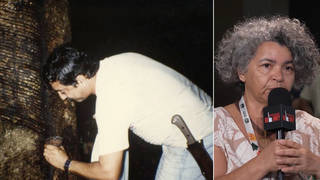
Guests
- Isabeau Doucetco-author of the Nation piece “The Shelters that Clinton Built.” She is a freelance journalist working in Port-au Prince, Haiti, where she has written for Haïti Liberté and worked for Al Jazeera.
- Isabel Macdonaldco-author of the Nation piece “The Shelters that Clinton Built.” She is a freelance journalist and former communications director of the media watch group Fairness and Accuracy in Reporting.
A new exposé in The Nation magazine reveals that trailers the Clinton Foundation donated to post-earthquake Haiti to use as temporary classrooms—and to double as hurricane shelters—are plagued by mold, shoddy construction. In at least one case, an air quality test revealed worrying levels of formaldehyde. The trailers were built by the same company that is being sued in the United States for providing formaldehyde-laced trailers to displaced residents after Hurricane Katrina. We speak with the journalists who broke this story, Isabel Macdonald and Isabeau Doucet. “What does it say about the reconstruction efforts in Haiti, if the very first project approved by the commission that’s supposed to ensure accountability and transparency in Haiti’s rebuilding passes this kind of project?” says Macdonald. “Bill Clinton himself has his hands all over it, and he is the co-chair of this commission that is supposed to ensure that Haiti is 'built back better.'” [includes rush transcript]
Transcript
AMY GOODMAN: Today marks one-and-a-half years since the devastating earthquake that ravaged Haiti, killing more than 316,000 people, leaving at least a million homeless. The country has slowly begun to build, but efforts have been slow in a country that was already one of the poorest in the Western hemisphere before the earthquake hit. Critics have faulted the efforts of international donors, including the U.S., for failing to deliver on pledges while exerting excessive control over the reconstruction process.
Former President Bill Clinton has played a major role in relief efforts, serving as the U.N. special envoy to Haiti and as co-chair of the Interim Haiti Recovery Commission. Through his Clinton Foundation, the former president has helped fund a number of projects in Haiti. Well, a new investigative report from The Nation magazine takes a critical look at the Clinton Foundation’s first recovery commission project in post-earthquake Haiti: the construction of shelters in the city of Léogâne. President Clinton first announced the project in a video on his foundation’s website.
BILL CLINTON: Many of you have expressed your interest in the progress being made in Haiti as the nation continues to recover from the earthquake. I wanted to give you just a quick update of some of our ongoing efforts to help the people build back better. The recent cholera outbreak serves as a stark reminder of the urgency we face to address and strengthen reconstruction efforts in Haiti. After the outbreak, my foundation responded, allocating a million dollars to the government, so that we can move supplies down there in a hurry. In addition to the health outbreaks, the hurricane season remains a threat, especially to those still living in camps. My foundation has contributed a million dollars there to the construction of emergency storm shelters in Léogâne.
AMY GOODMAN: But according to a new exposé in The Nation magazine, the shelters turned out to be a series of trailers beset with problems including mold, shoddy construction—in one case, worrying levels of formaldehyde. The trailers are also built by the same company, Clayton Homes, that’s currently being sued in the U.S. for providing formaldehyde-laced trailers to displaced residents after Hurricane Katrina. A student and teacher at a school housed in the trailers described the conditions there.
MONDIALIE CINEAS: [translated] The class gets so hot. The kids get headaches. And we go to the teacher for him to give us painkillers.
DÉMOSTHÈNE LUBERT: [translated] I believe that the grant foundation of Clinton, given that we’re speaking of a school, Clinton would build latrines for us, so that the children can go to the toilet safely, given that we’re under the iron rule of cholera. It’s not finished. It’s not too late. We’re waiting, waiting for a lot of things from Clinton. And Clinton can do good things for Haiti.
AMY GOODMAN: That video clip is courtesy of The Nation magazine and the Canadian Center for Investigative Reporting.
Well, for more, we’re joined by the journalists who broke the story, Isabel Macdonald and Isabeau Doucet. Their piece, “The Shelters that Clinton Built,” is in the July 11th issue of The Nation magazine, online at TheNation.com.
Isabeau, talk more about what you found.
ISABEAU DOUCET: Well, Clinton—this was one of the first projects of the commission, and there’s been very little transparency and accountability, despite all these buzzwords—you know, “sustainable development,” “community consultation”—around this commission. It’s kind of widely seen as very opaque and labyrinthian. So we thought we’d just pick one project and really investigate it. And since this was one of the first, and it was one of the few that’s actually completed, we thought, you know, perfect.
And what we found was, I mean, not only are these hurricane-proof shelters trailers, which cannot be hurricane-proof, according to U.S. standards, but they were riddled with any number of problems. They’re extremely hot. They’re leaking. There’s mold. You know, they’re visibly already starting to rot, even though they’re freshly installed. So we thought, given that Clinton himself was the one who coined this term, “build back better”—we’re going to “build back better” Haiti—what does this mean for what’s to come of the commission’s projects?
AMY GOODMAN: Isabel Macdonald, Clayton Homes, can you explain where these trailers came from and the problems they’ve had after Hurricane Katrina?
ISABEL MACDONALD: Well, we’ve been requesting documentation of any bidding process from the Clinton Foundation, and we have not gotten documentation. We know that they were built by Clayton Homes, which is currently being sued in the United States for exposing Hurricane Katrina survivors to injurious levels of formaldehyde, which the plaintiffs in this FEMA formaldehyde lawsuit claim came as a direct result of them residing in trailers that Clayton Homes had sold to FEMA. The Clinton Foundation has not answered our questions about any due diligence that was done. We know that trailers are considered a liability in the United States in the case of a hurricane. FEMA tells Americans to evacuate trailers. And so, the real question is, how did Bill Clinton think that this would be acceptable in Haiti to provide these trailers as hurricane shelters, to buy them from a company facing this kind of lawsuit over formaldehyde? And what does it say about the reconstruction efforts in Haiti, if the very first project approved by the commission that’s supposed to ensure accountability and transparency in Haiti’s rebuilding passes this kind of project? And Bill Clinton himself has his hands all over it, and he is the co-chair of this commission that is supposed to ensure that Haiti is “built back better.”
AMY GOODMAN: We’re going to have to leave it there, but we’ll link to The Nation and your investigation. Isabel Macdonald, Isabeau Doucet, thank you very much. The piece is called “The [Shelters] that Clinton Built.”












Media Options